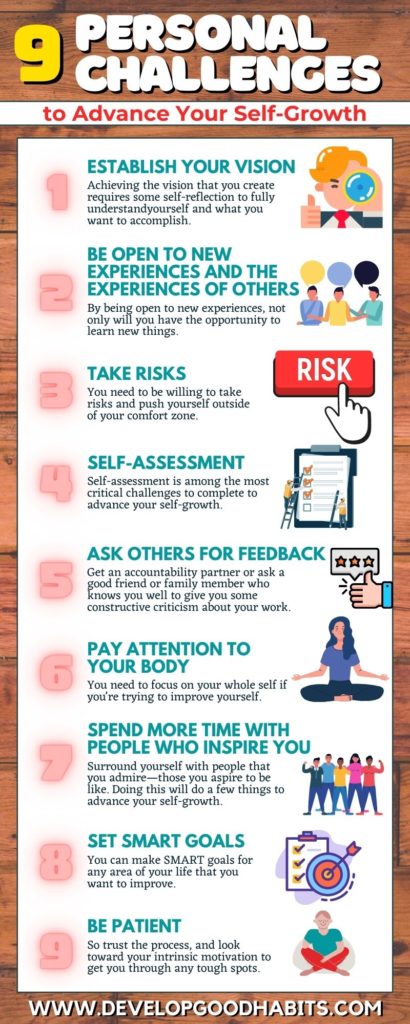If you could snap your fingers and create a picture-perfect future for yourself, what would it look like?
Look beyond your initial thoughts of being a gazillionaire and owning all of the things.
But if you can’t quite put those thoughts aside, with whom are you sharing that life? And how did you get there?
I think it’s safe to assume if you’ve been reading DGH for a while that you’ve adopted a growth mindset (and if you haven’t, this article can help you).
Along with your growth mindset comes a solid belief that with perseverance, patience, and practice, you can close the gap between your current self and your visionary future. You believe that you can complete the necessary requirements to fulfill your ambitions–whatever that may look like for you.
This type of mindset, and your behaviors that stem from it, is impossible to obtain if you don’t believe in self-growth.
And while many once thought that everyone is born with a certain level of intelligence, modern research on intellect and the dynamics of neuroplasticity have demonstrated that people actually have the potential to continuously expand their knowledge, skills, and abilities.
And here’s the kicker: You are in control of your intelligence.
You’re the one who makes a conscious decision to either take an empowered approach and manage your capacity for self-growth or…not.
So let’s look a bit more at what self-growth is and then go over some personal challenges you can tackle to advance your progress toward living up to your full potential.
What Is Self-Growth?
Self-growth has been the subject of research and theories for centuries.
While many historical figures have come up with theories about how one can reach their full potential, they all involve an ongoing process of developing skills and gaining knowledge following the completion of a standard formal education.
In simple terms, self-growth is a journey one embarks upon to continually become a better version of oneself.
Now, since everyone has their own unique life goals, the concept of advancing your self-growth can feel relieving, while also feeling a bit complex–there is not an instructional manual that is catered to your values and passions.
But that’s part of the beauty of it: the possibilities are infinite – you can learn as little or as much as you want in any subject. And you will be embarking upon an unprecedented and personally meaningful life path throughout the entire process.
Self-growth is an individualistic process that can involve any combination of a variety of things, such as earning an academic degree, cultivating emotional self-regulation skills, or discontinuing bad habits.
And you can certainly increase your capacity for self-growth by making your plans as unique as you are so they mean something to you.
By planning and implementing specific actions and processes toward achieving your desired outcomes, you will ultimately improve your overall performance and success. This process requires a continuous practice of challenging yourself by integrating new endeavors into your life.
Here are nine personal challenges that will help you advance your self-growth so you can continue to make progress toward reaching your full potential.
9 Personal Challenges to Advance Your Self-Growth
1. Establish Your Vision
What do you want out of life? Set aside the previously mentioned gazillion dollars. Who and what do you want to become?
Answering these questions requires you to have an acute awareness of your beliefs (and your limiting beliefs), a deep understanding of your values, and a personal definition of success. So what do you get when you put it all together?
Don’t just envision it in your head–get it down on paper.
According to the Schwartz Theory of Basic Values, the process of discovering your life’s vision requires methodical planning involving three elements: creativity, determination, and action.
Achieving the vision that you create requires some self-reflection to fully understand yourself and what you want to accomplish, and continuously following through with your action plans for self-growth.
Watch the video below to learn about some self-awareness activities that will help you know yourself better.
(For more resources to help you with this challenge, here are some self-awareness tests you can do, here are some questionnaires to fill out, and here are some activities to do. You don’t need to do all of them, just pick one or two that feel right for you.)
In addition to doing some reflection, you can use tools to help you create your vision, such as vision board apps and online templates.
Keep in mind that this process requires autonomy and a high level of self-sufficiency in your thinking and behavior–you can’t copy someone else’s.
But don’t set your vision in stone, because you will update this as you progress through life, have new experiences, and your priorities change.
2. Be Open to New Experiences and the Experiences of Others
Of course you need to experience new things in order to grow. If you stay in the same routine day after day and year after year, you’re not opening yourself up to anything aside from your routine.
By being open to new experiences, not only will you have the opportunity to learn new things, this process will also:
Additionally, having an openness to experiencing new things has been linked to a need for cognition, which is a desire to engage in new activities that are mentally engaging.
This includes activities like solving puzzles (which is a great exercise in cognition), finding new solutions to old problems, and analyzing new concepts.
Finally, those with high levels of cognition are less likely to fall for cognitive biases when listening to an argument, and are able to focus on aspects of the facts and ideas themselves, rather than the likability or position of the person speaking.
So by engaging in new experiences, you can undoubtedly grow in many ways– both personally and intellectually.
Check out these 30-day challenges for some ideas of new things you can do.
3. Take Risks
In addition to just being open to new experiences, you need to be willing to take risks, push yourself outside of your comfort zone, and look uncertainty straight in the face. According to Merriam-Webster, taking risks is the process of exposing oneself “to hazard or danger.”
But why would you want to put yourself in danger in order to better yourself?
When you take a more comprehensive perspective, you can see there are a lot of different kinds of risks–some of which we engage in every day. But for self-growth, the need is to take a deliberate risk to necessitate a change in direction in your life.
You take this type of risk when you decide to quit your job to go back to school, accept a position on the other side of the country, or choose to commit yourself to another person.
All of these choices involve an element of uncertainty, a fear of the unknown, and maybe even some guilt for leaving something behind that you’ve come to know so well.
There are three types of healthy risks that lead to self-growth:
Self-Improvement Risks
These risks involve giving up predictability, routine, and familiarity to possibly have a chance to grow.
You take this type of risk because you hope you can make your dreams come true by bridging the gap between where you are now and where your ultimate vision takes you. When you don’t take these types of risks, it can lead to regret.
Commitment Risks
Without making commitments, you will greatly limit your self-growth. The two types of commitment risks are relationship risks (i.e. getting married) and risks with making a commitment to a value (i.e. accepting accountability for a big project, investing in a stock, or investing a lot of time in something).
These are high-risk, high-reward opportunities that most of us take at some point that can result in either some kind of disappointment or a great advancement.
Self-Disclosure Risks
Self-disclosure risks involve revealing your true self such as your feelings, thoughts, and needs. This type of risk could include confronting a friend because you’re mad, or telling someone that you love them without being sure they will say it back.
You also take this risk when you admit to your supervisor that you made a mistake or failed to perform an important task. All of these put you in a position of potential rejection. But without taking these risks, you cannot be assertive to gain the things you want in life.
Taking risks requires you to make a conscious choice to take a chance with an element of uncertainty of the outcome. But the result of these risks will undoubtedly either put you ahead in life or help you learn how you may do things differently next time.
4. Self-Assessment
Self-assessment is among the most critical challenges to complete to advance your self-growth. People often evaluate their performances by judging their actions, but this only leads to self-criticism.
When you judge yourself, it doesn’t give you an action plan for improvement for next time. However, doing a self-assessment turns your focus to how you can improve whatever you’re trying to do.
So how can you do a proper self-assessment?
A self-assessment is different from self-reflection, in that self-reflection is more based on the past and self-assessment is meant to help you study your performance with the purpose of improving it for the future.
It is a proactive approach to self-growth with defined performance criteria measuring your strengths, improvements, and insights. The challenge involved with doing effective self-assessments really falls on your ability to be objective.
Let’s look at an example of a self-assessment.
Let’s say you just missed an important work deadline…again. So you want to improve your time management skills and reduce your propensity to procrastinate. Your first step in your assessment is to define the performance that you want to focus on, and why you want to improve it.
In this case, you want to focus on preparing your work in a timely manner to reduce future last-minute crises and improve your overall work performance.
Then you need to determine what criteria you want to measure and the attributes for each, which could look like this:
Then do the numbers.
For the first bullet, exactly how many people did you hold up?
How many co-workers were impacted by your procrastination?
Secondly, how many errors did you notice?
How does this compare with the number of minutes you spent working on the project?
Similar to creating SMART goals, you want to define your criteria in a measurable way so you can track your progress for next time.
Your completed self-assessment will include your strengths (such as: you managed to turn in the work, even though it was late), your areas for improvement (your time-management skills), and specific steps you will take to improve (next time, schedule time as soon as the project is assigned to focus on creating a plan to complete it on time).
As you go through this process several times, you will be able to see how you can measurably and objectively do some things to advance your self-growth.
5. Ask Others For Feedback
Don’t just rely on yourself to assess your work. Get an accountability partner or ask a good friend or family member who knows you well to give you some constructive criticism about your work.
You will achieve your goals when you ask other people for feedback often–but you have to make sure to listen, even if you don’t initially agree. As you did above with your self-assessment, be very objective with your thoughts and be open to others’ opinions.
Both positive and negative constructive feedback will give you the valuable information that you need to make future decisions.
People who are successful often haven’t made it to the top of their game by themselves; they’ve consistently and actively requested feedback from customers, family/friends, clients, employees, etc.
Top performers are good at accepting feedback because they recognize the value of the insight that it provides.
6. Pay Attention to Your Body
If you’re trying to improve yourself, you need to focus on your whole self–meaning, what you put into your body, how you spend your time, and being active.
Self-growth is a holistic process, so in order to get the full benefits from your efforts, you need to make sure that you're engaging in a whole mind, body, spirit endeavor.
Find an exercise regime that works for you and your schedule. Don’t force yourself into doing something you don’t enjoy–it will just increase your chances of putting it off. Also, make sure you’re fueling your body properly with whole foods that your body can actually use to give you clean energy.
Focus on or explore your spirituality to ponder the bigger, more complex questions about life–and the purpose of your self-growth journey.
Your mind is a tool that needs to be worked in order to function at a high level, and reading is one of the best ways to continue to learn and explore new concepts.
Engaging in these healthy living activities will support your other efforts to grow and improve yourself.
7. Spend More Time With People Who Inspire You
It can be hard to cut ties (or limit your interaction) with your childhood bestie. But if you have gone down completely different paths post-high school, be mindful of how the time you spend with that person is influencing your behaviors.
Instead, surround yourself with people that you admire—those you aspire to be like. Doing this will do a few things to advance your self-growth, including:
You may find these people in your own job or at networking events who work for your dream company. No matter how you get connected with them, take the opportunity to benefit yourself by learning from others.
8. Set SMART Goals
You knew this was coming. You can’t make much progress without having (and being organized by) SMART goals. You can make SMART goals for any area of your life that you want to improve.
As you know, SMART goals are an effective tool to use because they offer the clarity and focus that you need to stay motivated to achieve anything that you want. And, with defined objectives and a deadline, this isn’t something that you will put off until later…or…”some day”…
The video below provides a quick overview of SMART goal setting and several examples you can take inspiration from.
9. Be Patient
This might not be an active challenge that you can complete in a week, but it can certainly be a challenge for many. Going from your present self to your ideal self won’t happen overnight–and some of the progress may be very slow.
But while you may not see a difference in yourself from day to day, when you start looking back on past months and years, you will see how far you’ve come with your self-growth.
It is only with patience that you will continue to do the things that are necessary day in and day out while knowing that you may not experience immediate results.
So trust the process, and look toward your intrinsic motivation to get you through any tough spots.
Final Thoughts on Personal Challenges
To advance your self-growth, you have to be motivated and willing to work. However, once you start challenging yourself, you will see immeasurable results.
You will find a renewed sense of purpose in your life after learning new things. You will start to recognize that your long-term goals are within reach, and you will recognize how to use your full potential to benefit your life and your future.
And if you're looking for actual challenges you can do, be sure to check out these articles:
- 169 Fun 30-Day Challenge Ideas for Personal Growth
- 19 Ways to Challenge Yourself Every Day to Grow as a Person
- 21 Comfort Zone Challenges to Grow as a Person
Finally, if you want to take your goal-setting efforts to the next level, check out this FREE printable worksheet and a step-by-step process that will help you set effective SMART goals.

Connie Mathers is a professional editor and freelance writer. She holds a Bachelor's Degree in Marketing and a Master’s Degree in Social Work. When she is not writing, Connie is either spending time with her daughter and two dogs, running, or working at her full-time job as a social worker in Richmond, VA.




